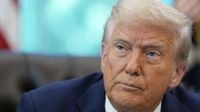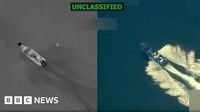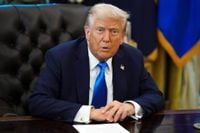President Donald Trump announced on September 19, 2025, that the United States military had carried out its third lethal strike this month against an alleged drug-smuggling vessel in international waters, intensifying an already controversial campaign in the Caribbean and South America. The strike, which Trump said killed three men he labeled as "narcoterrorists," was the latest in a series of military actions that have drawn both domestic and international scrutiny.
According to statements posted by Trump on his social media platform, the targeted vessel was "affiliated with a Designated Terrorist Organization conducting narcotrafficking in the USSOUTHCOM area of responsibility." The United States Southern Command (USSOUTHCOM) oversees operations in South America and the Caribbean Sea, regions that have long been corridors for illicit drug trafficking into North America.
Video footage released by the White House and shared widely on social media showed a speeding boat slicing through open waters before being struck by what appeared to be missiles from above, engulfing the vessel in a fiery explosion. The dramatic imagery was accompanied by a message from Trump: "Intelligence confirmed the vessel was trafficking illicit narcotics, and was transiting along a known narcotrafficking passage enroute to poison Americans." He added emphatically, "No U.S. Forces were harmed in this strike. STOP SELLING FENTANYL, NARCOTICS, AND ILLEGAL DRUGS IN AMERICA, AND COMMITTING VIOLENCE AND TERRORISM AGAINST AMERICANS!!!" (as reported by BBC and the Associated Press).
This third strike, which Trump said took place in international waters, follows two earlier attacks this month. On September 2, the U.S. military struck a speedboat allegedly operated by the Tren de Aragua gang, which the Trump administration had recently designated as a foreign terrorist organization. That attack killed 11 people, according to official accounts. A second strike on September 15 targeted a boat allegedly carrying drugs from Venezuela, resulting in three more deaths. In total, U.S. strikes have killed at least 17 people this month in actions justified by the administration as a necessary escalation to stem the flow of drugs into the United States (Los Angeles Times, AP, and BBC).
Historically, the U.S. government has relied on the Coast Guard and law enforcement agencies to intercept and board suspected drug vessels for inspection. The shift to military strikes marks a dramatic departure from this approach. Earlier in 2025, the Trump administration reclassified certain drug cartels as foreign terrorist organizations, opening the door to the use of lethal military force under legal provisions typically reserved for counterterrorism operations. Trump has repeatedly argued that such measures are warranted, stating that the traffickers are "transiting along a known narcotrafficking passage enroute to poison Americans."
However, this aggressive strategy has drawn sharp criticism from multiple quarters. Legal experts, human rights organizations, and several members of Congress—including both Democrats and some Republicans—have questioned the legality of using military force for what have traditionally been law enforcement operations. Concerns have been raised that the strikes may violate international human rights and maritime law, especially given the lack of public evidence regarding the nature of the targets or the process used to determine their alleged criminal affiliations. As BBC noted, "Legal experts previously told the BBC that the fatal strike on the first vessel in international waters may have violated international human rights and maritime law."
Adding to the controversy, the Trump administration has not provided detailed evidence to support its claims that the targeted vessels were, in fact, carrying narcotics or that the passengers were members of designated terrorist organizations. The Pentagon referred all questions to the White House, which did not immediately respond to requests for clarification about the origin of the vessels or the intelligence that led to the strikes (AP, Los Angeles Times).
On Capitol Hill, the debate has grown increasingly heated. Some lawmakers have argued that the use of military force for law enforcement purposes represents an overreach of executive authority. They worry that such actions set a dangerous precedent, blurring the lines between military and police functions and potentially undermining constitutional checks and balances. Human rights groups have echoed these concerns, warning that the strikes could amount to extrajudicial killings if not properly justified and documented.
The international response has been equally fraught. Venezuelan President Nicolás Maduro has condemned the strikes, accusing the United States of using drug trafficking accusations as a pretext for military intervention and regime change in his country. After the first strike, Maduro claimed that U.S. video evidence was fabricated using artificial intelligence and dismissed the notion that such small boats could operate in the high seas. Yet, in subsequent statements, he lashed out at what he described as U.S. "aggression," vowing that Venezuela would defend itself against any further attacks (AP, BBC, and France24).
Latin American leaders and regional organizations have also voiced alarm over the deployment of U.S. military assets to the Caribbean and off the coast of Venezuela. The current U.S. naval presence includes eight warships, a nuclear-powered submarine, and ten fighter jets stationed in Puerto Rico. Many in the region view this buildup with suspicion, fearing that it signals broader intentions beyond drug interdiction. As reported by France24, "The US military deployment – eight warships and a nuclear-powered submarine to the southern Caribbean off the coast of Venezuela and 10 fighter jets sent to nearby Puerto Rico – has been widely denounced in Latin America, stoking fears that the United States is planning to attack Venezuela."
Despite the mounting criticism, the Trump administration has stood by its actions. White House communications director Steven Cheung posted the strike video with a pointed remark: "It was at this moment, the narcoterrorists knew they screwed up." The administration maintains that the strikes are both effective and necessary to protect Americans from the scourge of narcotics and the violence associated with international drug trafficking organizations.
Yet, questions persist about the broader implications of this new approach. Is the reclassification of drug cartels as terrorist organizations a sustainable legal framework? Will the use of military force deter traffickers, or will it simply escalate violence and instability in the region? And perhaps most importantly, what safeguards are in place to ensure that the United States does not overstep its own laws or international norms in the name of national security?
As the debate continues, one thing is clear: the Trump administration’s campaign against alleged narcoterrorists marks a turning point in U.S. drug policy, with consequences that are likely to reverberate far beyond the Caribbean Sea.



